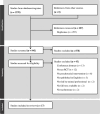Psychosocial interventions to improve sexual functioning in women with cancer: a systematic review of randomized controlled trials
- PMID: 38185918
- PMCID: PMC10986159
- DOI: 10.1093/sxmrev/qead052
Psychosocial interventions to improve sexual functioning in women with cancer: a systematic review of randomized controlled trials
Abstract
Introduction: Many women with cancer struggle with sexual side effects during and after treatment. Although preliminary evidence indicates that psychosocial interventions may be efficacious in improving sexual functioning for women with cancer, no systematic review has summarized the state of the science in this area.
Objectives: The primary goal of this review was to narratively synthesize the results of randomized controlled trials (RCTs) testing the efficacy of psychosocial interventions to address sexual dysfunction in women with cancer. A secondary goal was to describe the diversity of the included samples (ie, racial/ethnic and sexual minority).
Methods: Following the PRISMA (Preferred Reporting Items for Systematic Reviews and Meta-Analyses) guidelines, a systematic review was conducted examining RCTs of psychosocial interventions to improve sexual functioning for women with cancer. Articles were identified using MEDLINE, Embase, PsycINFO, and Cochrane CENTRAL. Two reviewers independently assessed each article for inclusion, with a third to resolve discrepancies.
Results: Seventeen studies were included in the review, 12 of which provided sufficient information to calculate effect sizes. Ten of the 12 studies primarily aimed to improve sexual functioning, all of which demonstrated positive effects on at least 1 outcome of sexual functioning. In the 2 RCTs of psychosocial interventions in which sexual function was a secondary aim, effects were negligible (ds = -0.04 and -0.15). Commonalities among the studies with large effect sizes were that they included education, mindfulness/acceptance, and communication/relationship skills as intervention components. Of note, there was an overall lack of sample diversity across studies, and most studies failed to report the race/ethnicity or sexual orientation of the participants.
Conclusion: Results support interventions targeting sexual functioning outcomes for women with cancer and suggest that multimodal interventions including education, mindfulness/acceptance, and communication/relationship skills may be most effective. Future research should also focus on examining the efficacy and potential adaptations of extant sexual functioning interventions for underrepresented groups.
Keywords: cancer; education; mindfulness; psychological; psychosocial; sexual functioning; systematic review.
© The Author(s) 2024. Published by Oxford University Press on behalf of The International Society of Sexual Medicine. All rights reserved. For permissions, please e-mail: journals.permissions@oup.com.
Conflict of interest statement
None reported.
Figures
Similar articles
-
Telephone interventions for symptom management in adults with cancer.Cochrane Database Syst Rev. 2020 Jun 2;6(6):CD007568. doi: 10.1002/14651858.CD007568.pub2. Cochrane Database Syst Rev. 2020. PMID: 32483832 Free PMC article.
-
Systematic screening and assessment of psychosocial well-being and care needs of people with cancer.Cochrane Database Syst Rev. 2019 Mar 26;3(3):CD012387. doi: 10.1002/14651858.CD012387.pub2. Cochrane Database Syst Rev. 2019. PMID: 30909317 Free PMC article.
-
A Systematic Review on Mindfulness Meditation-Based Interventions for Sexual Dysfunctions.J Sex Med. 2019 Oct;16(10):1581-1596. doi: 10.1016/j.jsxm.2019.07.019. J Sex Med. 2019. PMID: 31570137
-
Interventions to improve psychosocial well-being in female BRCA-mutation carriers following risk-reducing surgery.Cochrane Database Syst Rev. 2019 Oct 9;10(10):CD012894. doi: 10.1002/14651858.CD012894.pub2. Cochrane Database Syst Rev. 2019. PMID: 31595976 Free PMC article. Review.
-
The future of Cochrane Neonatal.Early Hum Dev. 2020 Nov;150:105191. doi: 10.1016/j.earlhumdev.2020.105191. Epub 2020 Sep 12. Early Hum Dev. 2020. PMID: 33036834
Cited by
-
The law on oncological oblivion in the Italian and European context: How to best uphold the cancer patients' rights to privacy and self-determination?Open Med (Wars). 2025 Jun 10;20(1):20251222. doi: 10.1515/med-2025-1222. eCollection 2025. Open Med (Wars). 2025. PMID: 40520342 Free PMC article.
-
Breast and Pelvic Cancer Survivors' Preferences for Psychosexual Interventions to Address Sexual Health Concerns: A Qualitative Study.Psychooncology. 2025 Jun;34(6):e70200. doi: 10.1002/pon.70200. Psychooncology. 2025. PMID: 40500244 Free PMC article.
-
From diagnosis to survivorship addressing the sexuality of women during cancer.Oncologist. 2024 Dec 6;29(12):1014-1023. doi: 10.1093/oncolo/oyae242. Oncologist. 2024. PMID: 39269314 Free PMC article. Review.
References
-
- Grover S, Hill-Kayser CE, Vachani C, Hampshire MK, DiLullo GA, Metz JM. Patient reported late effects of gynecological cancer treatment. Gynecol Oncol. 2012;124(3):399–403. - PubMed
-
- Maiorino MI, Chiodini P, Bellastella G, Giugliano D, Esposito K. Sexual dysfunction in women with cancer: a systematic review with meta-analysis of studies using the female sexual function index. Endocrine. 2016;54(2):329–341. - PubMed
Publication types
MeSH terms
Grants and funding
LinkOut - more resources
Full Text Sources
Medical


